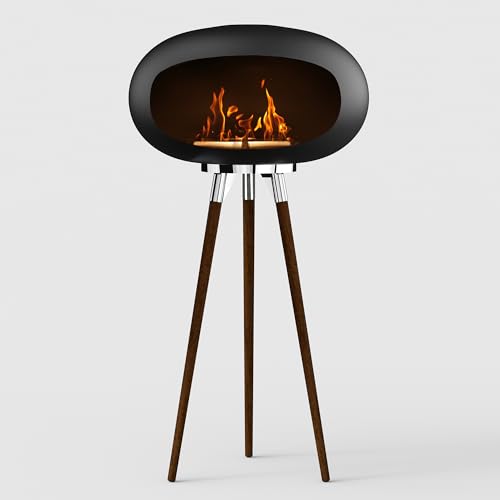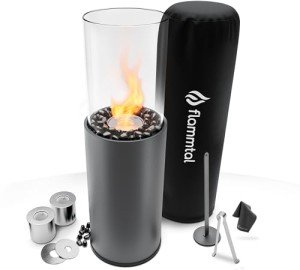You'll Never Guess This Bio Ethanol Fire Free Standing's Secrets
페이지 정보
작성자 Malorie 작성일 24-12-17 04:11 조회 3 댓글 0본문
 Bio Ethanol Fire Free Standing
Bio Ethanol Fire Free Standing A bio ethanol fire-free standing ethanol fireplace is a modern fireplace that burns clean liquid ethanol fuel. It does not give off smoke or fumes and is extremely simple to use.
A bio ethanol fire-free standing ethanol fireplace is a modern fireplace that burns clean liquid ethanol fuel. It does not give off smoke or fumes and is extremely simple to use.You simply add the bioethanol to the burner and then light. To extinguish, you simply place the rod over the flame to starve it of oxygen.
Burn time
You may have been discouraged from adding a fireplace because of the expense. Thanks to advances in technology, a bioethanol fireplace is now an option. This kind of fireplace makes use of liquid ethanol fuel that produces no fumes or smoke. It's also safe to use in indoor areas, and it requires no chimney or flue. As with any flammable fuel it is important to monitor the amount of fuel used and be cautious when moving the unit.
Bioethanol fireplaces come in various designs and are simple to set up. All you have to do is fill the burner box with bioethanol, light it, and then relax in your new fireplace. Many models are portable, which means you can easily move them from one room to the next. You can even set them outside if you wish. Make sure that your home is well ventilated to avoid the accumulation of carbon dioxide and pollutants.
These fireplaces are ideal for those who want an old-fashioned look but don't want to spend money on a chimney installation. They don't emit smoke or fumes, and they're easy to install. They're also a great way to save money on heating bills. Some even include a false flue to give an authentic appearance.
There are two primary kinds of bioethanol fireplaces: wall-mounted and inserts. Inserts are basic burners with glass shields for protection from the flame that is open. It can be placed in any fireplace to give it a contemporary appearance. Inserts are available in a wide range of shapes and sizes that means you can pick one that will fit the space perfectly.
A wall-mounted bioethanol fire is an excellent option for those who want to bring a modern look to their home. It's an excellent alternative to an electric or wood-burning fireplace, and it can be placed almost anywhere in the house. They are also easier to maintain than traditional fireplaces, and they are able to be easily moved from room to room.
Safety
As long that the fire is set on a solid surface and is kept at a safe distance from curtains and other flammable materials, a free standing bio ethanol fireplace is safe to use. They don't emit carbon monoxide and the flames they produce are smaller than those of wood or gas stoves. They do not produce soot, smoke or require a lot of maintenance. As with any fire or fireplace it is crucial to place them in a ventilated room and not leave them unattended.
To avoid accidents and damage To avoid damage and accidents, ethanol fireplaces must be installed and maintained properly. They must be constructed of a durable material and evaluated by an independent testing company to ensure that they are in compliance with industry standards. In addition the user's instructions should clearly outline any potential dangers and give specific precautions to follow when using them.
The ethanol fuel that burns in these fires is made by the fermentation of plant byproducts such as sugarcane and grain with yeast. Although these fuels are more sustainable than fossil fuels, they can be polluting since they release small amounts of carbon dioxide and other gases that can irritate the lungs if breathed in regularly. In addition, the crops that are grown for ethanol can divert the land from being used to produce food.
Ethanol fireplaces are safer than other fireplaces since they don't have massive fuel tanks or connections that could leak or fail. However, they're not completely safe because the fuel is liquid and could spill out of the tank if the fireplace is knocked over or if you fail to switch it off when you leave the room.
If this occurs, the flame could continue to follow the fuel, spreading to other parts of the room. Make sure you have an extinguisher close to the flame or by not touching it with your hands. When using a bio-ethanol fire it is recommended you open the windows a little to allow fresh air into the space.
Ventilation
If you have an ethanol-based bio fireplace, proper ventilation is important. Ventilation is essential to remove combustion byproducts and also allowing fresh air to flow into the room. This helps maintain the comfort of the space. Additionally the proper venting of a fire can help prevent carbon monoxide poisoning and other health issues that could arise. Moreover, it helps to reduce humidity and increases the efficiency of your heating system. It is therefore recommended to adhere to the manufacturer's recommendations on proper ventilation, and make sure your home is well ventilated when you use a Bio ethanol fireplace.
The majority of freestanding bio-ethanol fireplaces are designed like wood fireplaces however, unlike wood stoves they don't require wood to burn. These fireplaces are powered by a liquid fuel known as bioethanol, which is derived from the discarded wastes of specific crops such as sugar cane and corn. The fuel is then distilled, purified and then used in fireplaces.
These fireplaces made of bioethanol are very adaptable, as they don't require a chimney or venting and can be moved to any area of the room. This flexibility is particularly beneficial for small homes or apartments, where space is limited. Bio ethanol fireplaces are also suitable for outdoor use, if they are shielded from wind and rain.
The design of these fireplaces is extremely variable with a range of styles from a simple circular shape to a more traditional and rustic style. They can be affixed to the wall or placed onto a table. They come in a variety of colors and materials. Some models can be recessed into the wall, creating a fashionable accent piece for your living space.
These fireplaces can be found at home improvement stores or specialty fireplace shops and online retailers. They are usually simple to maintain and can be installed in any space. Ethanol fires are clean and emit no harmful gases, making them an environmentally-friendly alternative to wood or gas fireplaces. However, they may emit a slight smell when they first start to burn, which should dissipate quickly.
Although fireplaces are safe, they should always be kept at a fair distance from any flammable items and curtains. Additionally, they should never be moved while they are burning, as it could cause burns or other damage to the surroundings. It is also recommended to keep them out of places that are chilly, since they may produce some smoke.
Installation
Ethanol fireplaces make a fantastic addition to any home and can be easily installed. They can be set up anywhere in the room and don't require gas pipes or chimneys. They make use of an oil-based fuel that is made from renewable sources, referred to as bioethanol. They are less polluting and safer than fossil fuels like oil or coal, and they don't produce soot or ash. Ethanol fires also do not release volatile organic compounds into the air, which could cause respiratory irritation and irritation to lungs.
There are a variety of styles of bio ethanol fireplaces, ranging from freestanding models to wall-mounted ones. The installation process can differ based on the model you select. The majority of fireplaces come with instructions to guide you in the correct way to install them. The most important thing to do is follow the instructions provided by the manufacturer. These guidelines will ensure that your bio fireplace is safe for use and won't harm the surface around it.
The majority of recessed ethanol fireplaces contain tanks that hold the liquid ethanol. The tanks should be insulated, and then positioned in non-combustible walls. It is also important to keep the burner of the ethanol at least one millimeter away from any flammable material, including curtains and furniture. The tank must be kept in a dry, cool place and out of reach from children and pets.
A portable ethanol fireplace permits you to move it from room to room without needing to install it. This makes it perfect for homes with single-family units and apartments as well as hotels and restaurants. It is also easy to set up since there isn't any need for a chimney or electric connection.
Homeowners who want to add some modern flair to their home can opt for free standing bio ethanol stove-standing fire places made of ethanol. They don't produce harmful gases or smoke, so they make a great alternative to traditional wood-burning fireplaces. They are also easy to use and clean. The only drawback of free-floor standing bio ethanol fireplace ethanol stove is that it can be difficult to find bioethanol fuel in your area. It is possible to order it online or through a specialty retailer.
댓글목록 0
등록된 댓글이 없습니다.
